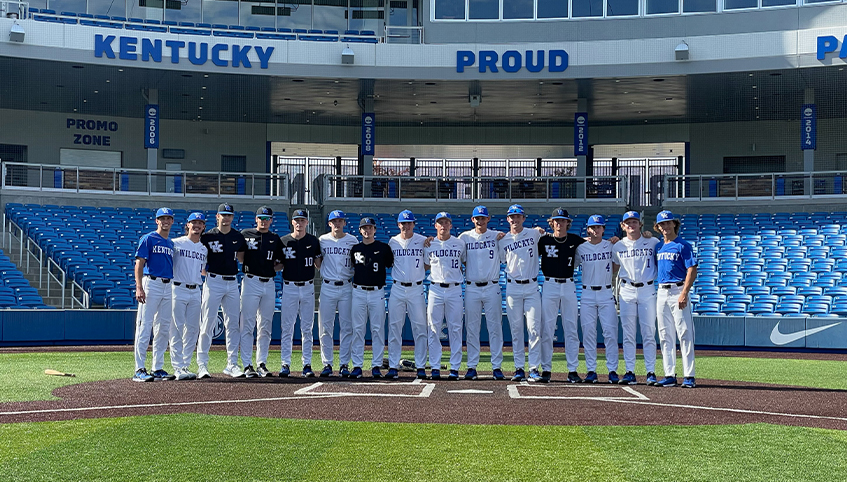June 27, 2023
Every baseball pitcher fears hearing a pop.
Jake Titus heard his elbow pop in spring 2022 during a game pitching for Ottawa High School. While the pop didn’t immediately cause him any pain, Jake knew things weren’t right when his pitches didn’t feel the same the following week.
An MRI revealed a tear in Jake’s ulnar collateral ligament in his elbow. The fix for that injury is Tommy John surgery.
What used to be an uncommon procedure reserved for the pros is now an option for youth athletes as young as middle school.
“I'm not sure if it's fortunately or unfortunately, but I have athletes who've had Tommy John surgery on my schedule 5 days a week,” said Kyle Veazey, DPT, a physical therapist at the Sports Medicine and Performance Center.
While Tommy John surgery is becoming more common, it is still an intensive process that requires a lot of rehabilitative physical therapy and ongoing training and conditioning.
“Everyone just really concentrates on the elbow, but a lot of times when you have injuries, the elbow's really a victim of everything else not being right,” said Vincent Key, MD, who is an orthopedic surgeon at The University of Kansas Health System as well as the medical director and head team physician for the Kansas City Royals. “Most people don't understand that to be able to throw a baseball at the velocity these guys are throwing, you have to really have a strong core, you have to have a strong lower half.”

For Jake, who had signed to play college baseball at the University of Kentucky before the injury happened in his junior year, it was never a question of if he would get the surgery and come back. It was where and how. He found the right team at The University of Kansas Health System with Dr. Key as his surgeon and Veazey as his physical therapist.
Jake and his dad, Jarrod Titus, talk through his injury in the following video. It also features a physical therapy session with Veazey and a follow-up visit with Vincent Key, MD.
My name is Jake Titus and I had Tommy John surgery. There was a pretty prominent pop when it happened. It really didn't hurt that bad, so I just stopped throwing after it and then noticed it a week later. The throwing wasn't the same.
Jarrod Titus, Jake's father:
Just from being in baseball for a long time, when you hear about the pop, an elbow can pop without any damage, but you kind of thought that there would be some damage. And then after a week when he still wasn't feeling better, we went in, had the MRI and did all that and oh, it wasn't fun.
When you threw on Tuesday, it was still just fastballs and change ups?
Jake Titus:
Yeah.
Kyle Vezy:
Yeah. My name's Kyle Vezy and I'm a physical therapist at the University of Canada Health System. I'm not sure if it's fortunately or unfortunately, but I have athletes who've had Tommy John surgery on my schedule five days a week. This is not the treatment I would do on every single person. This is only a select few athletes who I feel like would tolerate and benefit from this treatment really well, and he is one of those.
Jake Titus:
Kind of like, you've got long fingernails and you're scratching yourself kind of hard. It's kind of what it feels like. He feels super professional because always sounds like he knows what he is talking about, and I'm pretty sure he does, explains everything pretty well.
Kyle Vezy:
At the end of the day, it's all about the athlete and helping their arm recovering and helping them feel the best they can, and nothing I felt has me worried or concerned or felt way different today than it has.
Jake Titus:
It's been feeling better too.
Jarrod Titus:
Physical therapy has been very long. Three days a week, two days a week, on and off, on and off, on and off. His first 90% bullpen he hit 90, and then it didn't feel so good, but he hit 91 the next time, and then it didn't feel so good. And it's just up and down, up and down.
Dr. Key:
Hey, everybody.
Jarrod Titus:
How are you?
Dr. Key:
How are you?
Jarrod Titus:
Good.
Dr. Key:
How you doing?
Jake Titus:
Good.
Jarrod Titus:
Dr. Key's been great and Kyle's been awesome, so it's just comforting to see and to know that they know what they're doing.
Dr. Key:
Play your position, be a good teammate, get through the year, get to the SEC.
Jake Titus:
Yeah.
Dr. Key:
Let's go.
Jarrod Titus:
Him going to Kentucky, he's going to be able to learn from some of the best coaches around, play against some of the best competition in the country, and he's got to continue to work hard, which he does.
Jake Titus:
I got the God-gifted talent to do it, so I think I just got to work hard.
After working through physical therapy and slowly returning to pitching, Jake was able to throw an inning at senior day in the spring. He’s now looking forward to joining the Kentucky Wildcats in the fall.
“At the end of the day, it's all about the athlete; helping their arm recover and helping them feel the best they can,” Veazey said.





